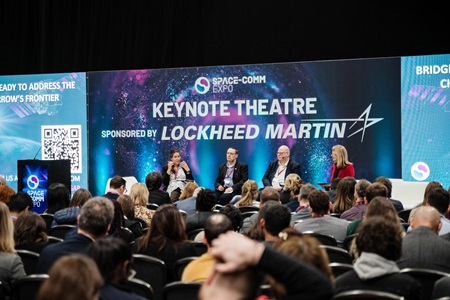 The global space industry is projected to reach $1 trillion by 2030, with the number of satellites expected to triple to 30,000, according to a report by the Space-Comm Expo, the premier UK and international event series for the space sector, which has released its annual survey highlighting key trends and challenges for 2025.
The global space industry is projected to reach $1 trillion by 2030, with the number of satellites expected to triple to 30,000, according to a report by the Space-Comm Expo, the premier UK and international event series for the space sector, which has released its annual survey highlighting key trends and challenges for 2025.
The survey, drawing insights from leaders across government, aerospace, defence, academia and business, reveals a dynamic industry driving global economies through satellite communication and connectivity. Events in the 2025 Space-Comm Expo series will take place at ExCeL London (March 11-12), Dubai World Trade Centre (October 6-7), and SEC Glasgow (December 3-4), attracting major stakeholders, including NASA, ESA and international government officials.
Survey participants identified space sustainability and debris management (68%), artificial intelligence and data analytics (65%), and satellite internet and connectivity (45%) as the top three trends shaping the industry in 2025.
The biggest challenges to growth for the commercial space sector in 2025 ranked as follows; high costs and funding limitations, talent shortage and skills gap, technical complexities and risks, regulatory and policy barriers, limited market demand and adoption, and competition from established players.
In terms of international regions for exploring growth, Europe came first followed by North America, Asia, the Middle East, Africa and South America.
With the international nature of space, when asked what the most important areas for global collaboration are; 60% ranked space debris and sustainability, 44% regulation and space law, 33% defence and security, 26% space traffic management, 23% earth observation and climate control, 23% space exploration to the moon and mars, and 18% satellite internet and connectivity.
When exploring the biggest drivers for the industry in the next five years for space missions; 48% saw a balance between government and the commercial sector, 36% saw the sector increasingly being driven by commercial ambitions, and 16% primarily government by some commercial support.
The most pressing top five regulatory and compliance issues were ranked as follows; space debris and sustainably, licensing and compliance procedures, international collaboration, data privacy and cybersecurity, ownership and utilisation of space resources.
The top five most critical skills for the growth of the space sector were; AI and robotics, aerospace design and engineering, systems engineering and project management, cybersecurity and software development, data science and machine learning.














Add Comment